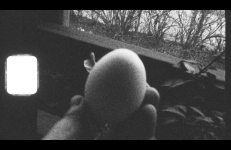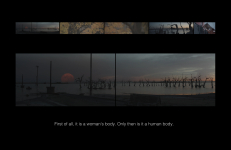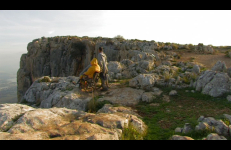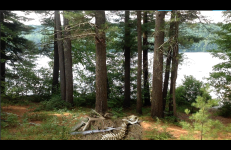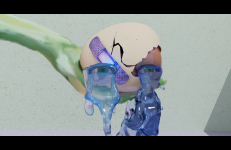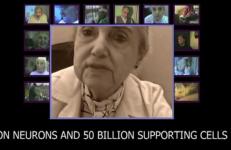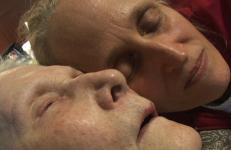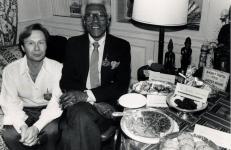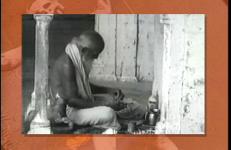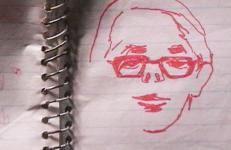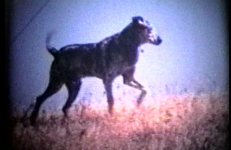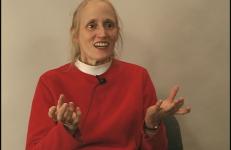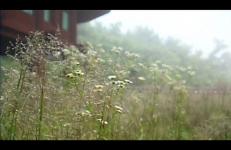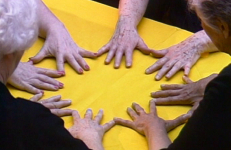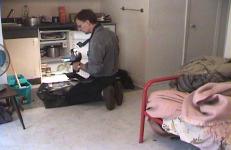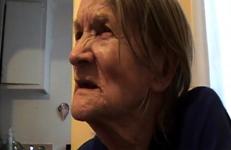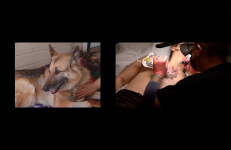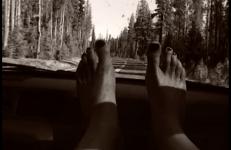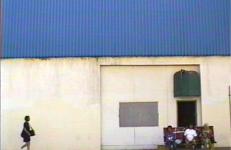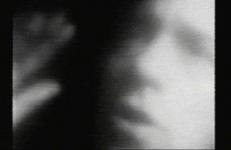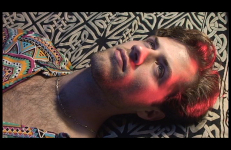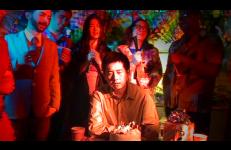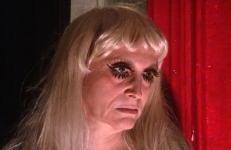A video diary about Cuthand's efforts to undergo artificial insemination. Cuthand contemplates a desire to have children and its relation to preserving Indigenous culture.
Aging
The sonic fabric of 2nd Person, [originally] a multi-channel video installation, is formed through an array of women’s voices orchestrated as parallel tracks in a musical composition. The speakers, all women I have intimately known at different points in my life -- my child, my mother, my best friends, students, mentors -- talk with me about aging, growing up, death, motherhood, love and loss.
In 50 Blue a young man (the artist’s brother) pushes an elderly disabled man (the artist’s father) in a wheel chair through a muddy landscape. It is a long and exhausting trip to an unknown destination only discovered at the end. After an arduous struggle the two arrive at the edge of a grey lake where a 10-meter high guard tower stands. The young man ties the wheel chair to a rope and hoists the old man up on the tower platform with the help of eight men, all dressed in yellow plastic raincoats.
The dog in dreamland? Or at least one of us is…
–– Ken Kobland
An animation developed from the collective experiences of a diverse group of LGBTQIA+ people to create a narrative. The result is a queer valentine having a fever dream.
“When I moved to Hudson Valley, NY state in 1984 after being tied to Tehching Hsieh in his ART/Life: One Year Performance, I began meeting remarkable elders over 80, and sometimes 90, years old. They became my mentors, guides, friends, helpers and spiritual directors. I took hours and hours of my footage to video artist Tobe Carey and he and I collaged it together collaboratively to make this document of these helpers along the way.”
--Linda Montano
“When I moved to Hudson Valley, NY state in 1984 after being tied to Tehching Hsieh in his ART/Life: One Year Performance, I began meeting remarkable elders over 80, and sometimes 90, years old. They became my mentors, guides, friends, helpers and spiritual directors. I took hours and hours of my footage to video artist Tobe Carey and he and I collaged it together collaboratively to make this document of these helpers along the way.”
--Linda Montano
Annie Lloyd is a daughter's poetic documentation of the last few years of her mother's life and an intimate portrayal of the creativity and wisdom of old age.
This title is also available on Cecelia Condit Videoworks: Volume 2
In the late 1970s, Walter Naegle was walking to Times Square to buy a newspaper when he ran into a striking older African American man on the corner. Walter says that “lightning struck” and his life changed forever at that moment. The man on the corner was Bayard Rustin.
"In 1997 I went to Benares, India to study the Hindu practice of burning the bodies of their dead on the Ganges ghats. My purpose was:
1. To become more at ease with death, a hidden western phenomenon;
2. To de-fuse fear around seeing death;
3. To watch how Hindu elders congregate in Benares to die since dying here in this holy city guarantees "moksha", no rebirth. Visiting temples and ashrams for the elderly allowed me to observe how they use their time and prepare for their eventual passing.
Through a stack of personal journals, this video reconstructs a biography of the South Dakota-born, New York City-enlightened artist James Wentzy. Tracing his days starting out as a struggling artist and later involved as an AIDS activist, the video provides an intimate portrait of a neglected hero. Wentzy reads from journals and shares old family snapshots and notebook sketches. “I hope I don’t die of sainthood,” Wentzy jokes in an entry from 1990—the pivotal time when he was becoming involved with ACT-UP and beginning to live healthier after the revelation of his HIV-positive status.
Take a peek at scenes extracted from a videomaker's life. See him amid the glittering domain of glamour being given an award for his work visual work. Meet some of his family, including the "furry ones" – (his cats and rainbow coated dog), and stroll along with him into the deep woods at twilight.
In this interview American filmmaker, poet, and lyricist, Cecelia Condit gives shape to the contours of her work process. The artist describes the influence of her relationship with her mother, her long-term investment in the macabre, and her ongoing desire to confront death through art. While covering a broad range of topics, Condit’s discussion of her work and interests returns to several defining themes: aging, grotesqueness, and the notion of movement, both in terms of her own past as a dancer and the notion of the body in decay. With a particular emphasis on the production and context of her videos, Annie Lloyd (2008), and All About a Girl (2004), this interview offers insight into the artist’s fascination with aging, sweetness, and storytelling, while also articulating her joyful sense of discovery within the art-making process. No longer working with scripts, Condit presents herself in the interview as a scavenger–much like the crows she incorporates into her work–assembling videos which straddle the line between strange and silly. – Faye Gleisser
In 1993 President Mitterrand visited Korea. On this visit Mitterrand promised that he would restore to Korea the 297 volumes of the Oe-Kyujanggak Archives (the royal protocols of Chosun Dynasty in Korea), pillaged by the French army in 1866 and now part of the collections in the Bibliothèque Nationale de France (National Library of France). As a sign of intent, he assured the interested parties that a two-volume book, the Hyikyungwon-Wonsodogam-Uigwe, would be immediately returned.
“The idea was to address the cultural invisibility of older women through art and through action,” the voice-over explains as this video begins. This short works offers an introduction to the Whisper Minnesota Project, which organized The Crystal Quilt performance, an event that brought together hundreds of women over 60 on a Mother’s Day in Minneapolis. As the video explains, “The Crystal Quilt is a case study in reframing notions of older women’s beauty, power, and relevance. Through it we catch glimpses of life patterns and values lost to our generation.”
In his signature photographic style, Donigan Cumming eulogizes a dying friend through his exploration of “culture” in all its manifestations: 1. culture: a particular civilization at a particular stage 2. culture: the tastes in art and manners that are favored by a social group 3. culture: all the knowledge and values shared by a society 4. culture: the growing of micro-organisms in a nutrient medium 5. culture: the raising of plants or animals.
In this video, made soon after the death of his mother Stella, we accompany George to the wake, and on to a trip to Albert Maysles holiday home on Fisher's Island.
"Deep waters flow around the living, dead and inanimate objects that bring this picture to life on the wide screen tapestry of electronic reality. Come and join the young and old of eastern energies as they bask in the sun and shadows of past sins and future fortunes. See how the other side lives and devours the fruits and nuts that pepper this great nation with neon nutrients worthy of Broadway and beyond!"
A document of two life processes: the passing of my friend Andre’s 10 year old German Shepherd, Cortàzar, and the tattooing of Cortàzar‘s image on Andre’s chest.
Please be advised, this video contains scenes of death.
Sassy, iconoclastic, and never-married, Los Angeles filmmaker Susan Mogul rides shotgun with ex-lovers, almost lovers, and her Dad, in a road movie turned inside out. Conversations with each driving man - pornographer, tuba player, TV critic, long haul truck driver, and more - are catalysts to reflect upon the past and comment about the present.
Filmed in Susan Mogul’s Los Angeles multi-ethnic working class neighborhood, Highland Park, Everyday Echo Street: A Summer Diary, is an insider’s view of how home and neighborhood are constructed in everyday relations. Composed of conversational and anecdotal portraits of neighbors and merchants, Susan ruminates about the past and the present, as she looks out her apartment window. Struggling to arrive at a new definition of “home,” she ponders loss, middle age, and living alone.
Images of beauty rituals – both masculine and feminine – focus on the removal of body hair. Scenes of adolescent embarrassment are played out in adult life. Gender confusion lurks behind the curtain. Impoverished aesthetics. Popular music.
In Final Exit, an aged one is confronted with his options in blunt terms. Does he want to drag out his existence, increasingly infirm and a burden to his caretakers, or go quietly before resentment overwhelms sentiment? Does he wish to go on living, the quality of his life increasingly diminishing, or be euthanized? Would he prefer cremation or burial? This video confronts the issues of mortality and advancing decrepitude that faces even the friskiest.
Twilight deepens, Night descends and moods sink into madness. But the mind refuses to exist in dark places, and struggles to resurface so that the soul can breathe-in spiritual enlightenment.
'Misery' doesn't like 'company' -- but 'company' does love a 'party', so come join in on a catastrophic celebration, and do 'hang on' tight -- because it's a steep ride down into the depths of a soul in meltdown mode!
This audio, visual laxative empties the mind of inhibitions to allow the spectator entrance into the whirlpool of sexual fixations. It also offers a recipe for love potions and recites demonic spells that influence bodies in shower rooms. Enjoy those black and blue antic perpetrated below the belt and recorded now for public consumption.




